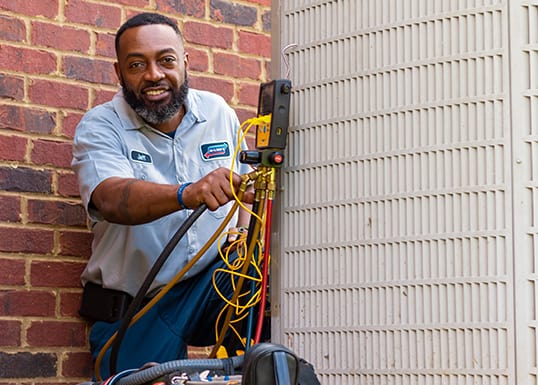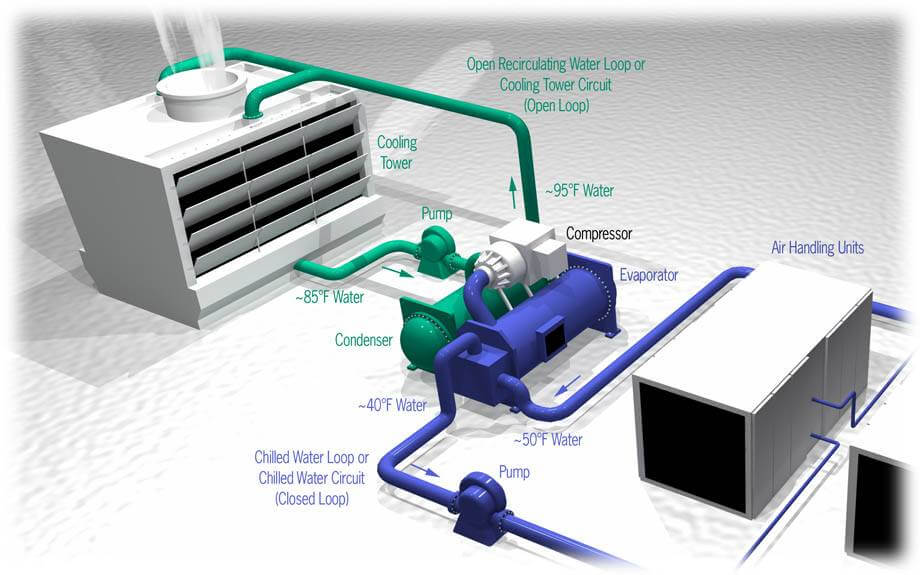Explore how HVAC experts provide prompt service options
Discovering the Important Parts of an Efficient HVAC System
An effective cooling and heating system is developed on numerous critical elements that operate in consistency. Each part, from the thermostat to the ductwork, plays a necessary role in maintaining convenience and power effectiveness. Understanding these components is crucial for maximizing efficiency and enhancing indoor air top quality. As one checks out these components, the intricate partnerships between them reveal insights right into improving overall system performance. What particular factors contribute most to this efficiency?
The Duty of the Thermostat in Cooling And Heating Effectiveness

Although frequently ignored, the thermostat plays a crucial role in the performance of a/c systems. HVAC experts. This small device serves as the primary nerve center, managing temperature settings and making certain suitable convenience within an area. By accurately picking up the ambient temperature, the thermostat communicates with the ventilation, air, and home heating conditioning devices to preserve the wanted environment
An efficient thermostat decreases power intake by triggering the a/c system just when required, consequently stopping extreme home heating or air conditioning. Modern clever and programmable thermostats enhance this performance even more by permitting users to set routines and remotely adjust settings, adapting to everyday routines.
The positioning of the thermostat is crucial; incorrect place can lead to inaccurate temperature level analyses, resulting in inefficient procedure. Generally, a well-functioning thermostat not just improves comfort yet additionally contributes significantly to power cost savings and the longevity of the heating and cooling system.
Recognizing the Significance of Air Filters
Air filters offer an important function in heating and cooling systems by guaranteeing that the air circulating within a space stays clean and healthy and balanced. These filters trap dust, irritants, and other contaminants, preventing them from being recirculated throughout the environment. By catching these bits, air filters contribute to enhanced indoor air top quality, which can considerably profit owners' health and wellness, especially those with allergic reactions or respiratory conditions.
In addition, keeping tidy air filters improves the effectiveness of a/c systems. Stopped up filters can restrict airflow, triggering the system to work more challenging to preserve wanted temperatures, leading to raised power consumption and higher energy costs. Frequently changing or cleaning up filters is a crucial maintenance step that can prolong the life expectancy of HVAC tools. Eventually, comprehending the relevance of air filters allows property owners and structure managers to take aggressive procedures to ensure a well-functioning, reliable heating and cooling system that promotes a secure and comfortable indoor atmosphere.

The Functionality of the Furnace and Heat Pump
Furnaces and warm pumps are critical components of HVAC systems, liable for giving warmth during chillier months. Heating systems operate by home heating air with combustion or electric resistance, then dispersing it throughout the home using air ducts. They typically supply fast heating and can be fueled by gas, electricity, or oil, depending on the system type.
Conversely, heatpump transfer warm as opposed to produce it. They remove warm from the outdoors air or ground, even in reduced temperatures, and transfer it inside. HVAC experts. This dual capability permits heatpump to likewise give air conditioning in warmer months, making them versatile choices for year-round climate control
Both systems call for appropriate maintenance to ensure effectiveness and durability. While heaters master severe cold, heatpump can be advantageous in moderate environments. Recognizing their distinct capabilities help house owners in picking the most appropriate choice for their home heating requires.
Exploring the Air Conditioning Device
The cooling system is a crucial component of heating and cooling systems, offered in various kinds to suit different needs. Comprehending the efficiency rankings of these units is important look at this site for making educated options regarding power usage and expense. This area will certainly explore the varied sorts of air conditioning unit and make clear just how effectiveness rankings impact performance.
Types of Air Conditioners
While different factors influence the choice of a/c systems, comprehending the different types available is essential for home owners and structure supervisors alike. Central air conditioners are developed to cool down whole homes or structures, using a network of ducts for air movement. Window units use an even more localized service, ideal for solitary areas or small spaces. Mobile air conditioning unit give adaptability, permitting customers to relocate the unit as needed. Ductless mini-split systems are an additional alternative, incorporating the performance of central systems with the convenience of zoning, as they require no ductwork. Ultimately, geothermal systems harness the planet's temperature for energy-efficient air conditioning. Each type features unique advantages, making informed options essential for effective climate control.

Performance Ratings Discussed
Understanding performance scores is essential for choosing the best air conditioning system, as these metrics provide insight into the system's performance and power consumption. One of the most usual ranking for a/c is the Seasonal Energy Performance Proportion (SEER), which measures the cooling result throughout a regular air conditioning season split by the total electric energy input. A higher SEER shows much better efficiency. Furthermore, the Energy Efficiency Proportion (EER) is made use of for gauging effectiveness under particular problems. An additional essential metric is the Power Celebrity certification, which symbolizes that an unit fulfills rigorous power effectiveness guidelines. By assessing these rankings, consumers can make informed choices that not only optimize convenience but likewise reduce energy prices and ecological impact.
The Relevance of Ductwork and Airflow
Reliable ductwork style and airflow monitoring play vital duties in the overall effectiveness and performance of heating and cooling systems. Proper ductwork assurances that conditioned air is distributed evenly throughout a room, reducing temperature level variations and improving convenience. Well-designed ducts decrease resistance to airflow, minimizing the work on cooling and heating tools and eventually reducing power usage.
Airflow management entails tactically placing vents and registers to boost the flow of air. This protects against common concerns such as cold or warm spots, which can happen when air movement is obstructed or go to my blog improperly well balanced. Furthermore, the ideal duct materials and insulation can even more boost effectiveness by lowering warm loss or gain throughout air transportation.
A reliable ductwork system not just adds to power cost savings however can additionally lengthen the lifespan of heating and cooling equipment by lowering unneeded stress (HVAC experts). As a result, recognizing the importance of ductwork and airflow is vital for achieving peak HVAC system performance
Routine Maintenance Practices to Improve Performance
Regular maintenance practices are important for ensuring peak performance of cooling and heating systems. These practices consist of regular evaluations, cleansing, and essential repairs to maintain the system running effectively. On a regular basis changing air filters is crucial, as stopped up filters can obstruct air flow and decrease effectiveness. Additionally, specialists ought to inspect and clean evaporator and condenser coils to avoid overheating and power waste.
Yearly specialist assessments are likewise recommended, as experienced specialists can determine prospective issues before they intensify. Lubing relocating components lessens deterioration, adding to a much longer lifespan for the system. In addition, making sure that the thermostat operates properly help in preserving excellent temperature control.

Regularly Asked Questions
Exactly how Typically Should I Change My Thermostat?
Thermostats ought to commonly be changed every 5 to ten years, depending upon usage and innovation innovations. Normal checks are a good idea to assure peak performance, specifically if experiencing irregular temperature control or boosted power expenses.
What Size Air Filter Is Best for My HVAC System?
The best size air filter for a heating and cooling system varies by device layout. Usually, it's important to speak with the owner's manual or examine the existing filter measurements to ensure peak efficiency and air top quality.
Can I Set Up a Heatpump Myself?
Installing a heatpump independently is possible for competent individuals, yet it calls for knowledge of electric systems and local codes. Hiring a professional is advised to ensure appropriate installment and excellent system performance.
How Do I Know if My Ductwork Is Reliable?
To determine ductwork effectiveness, one need to look for leaks, step air flow at vents, examine insulation quality, and examine temperature differences in between supply and return air ducts. Expert assessments can offer detailed understandings into general performance.
What Are Indicators My Heating And Cooling Requirements Immediate Maintenance?
Indicators that a heating and cooling system needs instant maintenance include unusual sounds, irregular temperatures, raised energy costs, undesirable odors, and regular cycling. Addressing these concerns promptly can prevent additional damage and warranty peak system performance.
Air filters offer a crucial function in A/c systems by ensuring that the air flowing within a space stays clean and healthy. Additionally, keeping clean air filters boosts the efficiency of Heating and cooling systems. Ductless mini-split systems are one more alternative, incorporating the effectiveness of central systems with the comfort of zoning, as they need no ductwork. Understanding efficiency ratings is crucial for choosing the appropriate air conditioning device, as these metrics offer insight right anchor into the system's efficiency and power intake. The finest size air filter for a Heating and cooling system differs by device layout.